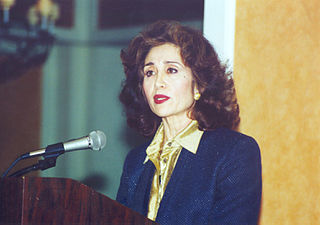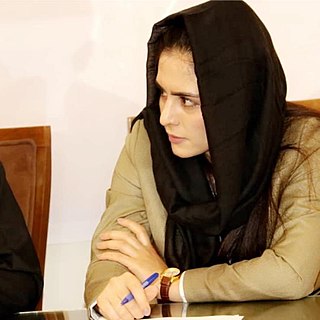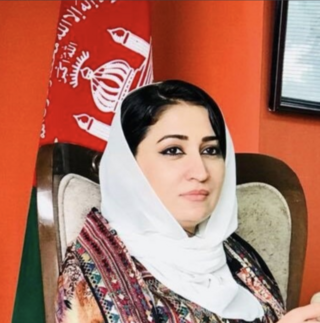Related Research Articles

Abdul Rashid Dostum is an Afghan warlord, exiled politician, former Marshal in the Afghan National Army, founder and leader of the political party Junbish-e Milli. Dostum was a major army commander in the communist government during the Soviet–Afghan War, and in 2001 was a key indigenous ally to U.S. Special Forces and the CIA during the campaign to topple the Taliban government. He is one of the most powerful warlords since the beginning of the Afghan wars, known for siding with winners during different wars. Dostum has also referred to as a kingmaker due to his significant role in Afghan politics.

The Taliban, which also refers to itself by its state name, the Islamic Emirate of Afghanistan, is an Afghan militant movement with an ideology comprising elements of Pashtun nationalism and the Deobandi movement of Islamic fundamentalism. It ruled approximately 75% of the country from 1996 to 2001, before it was overthrown by an American invasion. It recaptured Kabul in August 2021 following the departure of coalition forces, after 20 years of Taliban insurgency, and now controls all the country. The Taliban government is not recognized by any country and has been internationally condemned for restricting human rights, including for women to work and have an education.

The treatment of women by the Taliban refers to actions and policies by two distinct Taliban regimes in Afghanistan which are either specific or highly commented upon, mostly due to discrimination, since they first took control in 1996. During their first rule of Afghanistan, the Taliban were notorious internationally for their misogyny and violence against women. In 1996, women were mandated to wear the burqa at all times in public. In a systematic segregation sometimes referred to as gender apartheid, women were not allowed to work, nor were they allowed to be educated after the age of eight. Women seeking an education were forced to attend underground schools, where they and their teachers risked execution if caught. They were not allowed to be treated by male doctors unless accompanied by a male chaperone, which led to illnesses remaining untreated. They faced public flogging and execution for violations of the Taliban's laws.

Dr. Massouda Jalal is the first woman in the history of Afghanistan who ran for the Office of the President of Afghanistan in 2002, 2004, and again in 2019. Dr. Jalal emerged as a leading voice of Afghan women after her election as the Representative to the 2002 Loya Jirga as she became one of the frontrunners for the position of Interim President of Afghanistan, opposite to ex-president Hamid Karzai.

Women's rights in Afghanistan have oscillated back and forth depending on the time period as well as the regime in power. After King Amanullah Khan's attempts to modernize the country in the 1920s, women officially gained equality under the 1964 Constitution. However, these rights were taken away in the 1990s through different temporary rulers such as the mujahideen and the Taliban during the Afghan civil war. During the first Taliban regime (1996–2001), women had very little to no freedom, specifically in terms of civil liberties. When the Taliban was overthrown by the United States following the September 11 attacks, women's rights gradually improved under the presidential Islamic Republic of Afghanistan. Women were de jure equal to men under the 2004 Constitution.

The Taliban, which also refers to itself by its state name, the Islamic Emirate of Afghanistan, is an Afghan militant movement, that governs Afghanistan, with an ideology comprising elements of Pashtun nationalism and the Deobandi movement of Islamic fundamentalism.

Sushmita Banerjee, also known as Sushmita Bandhopadhyay and Sayeda Kamala, was a writer and activist from India. Her works include the memoir Kabuliwalar Bangali Bou based on her experience of marrying an Afghan and her time in Afghanistan during Taliban rule. The story was used as the basis for the Bollywood film Escape from Taliban. She was killed at age 50 by suspected Taliban militants during the evening of 4 September or in the early morning hours of 5 September 2013, outside her home in Paktika Province, Afghanistan.
Rape is a major issue in Afghanistan. A number of human rights organizations have criticized the country's rape laws and their enforcement.

Sima Wali was one of the foremost Afghan human rights advocates in the world, serving as an international campaigner for the liberties and empowerment of refugee and internally displaced populations. She was the Chief Executive Officer of Refugee Women in Development (RefWID), Inc., a global non-profit organization that advocated for the civil rights of refugee women and girls fleeing from conflict and for their equitable reintegration into their societies. She was also the vice president of the Sisterhood Is Global Institute, the world’s first feminist think tank.

Peace processes have taken place during several phases of the Afghanistan conflict, which has lasted since the 1978 Saur Revolution.
Rabia Nasimi is a former refugee who fled Afghanistan with her parents and siblings in 1999 and now campaigns for refugee rights in London.

Roya Rahmani is an Afghan diplomat who served as Afghanistan's first female ambassador to the United States and non-resident ambassador to Mexico, Argentina, Colombia, and the Dominican Republic from December 2018 to July 2021. She is currently the Chair of the international advisory company in development finance — Delphos International LTD. She is also a distinguished fellow at the Georgetown Institute for Women, Peace, and Security, a senior advisor at the Atlantic Council's South Asia Center, and a senior fellow for international security at the New America Foundation. From 2016 to 2018, she served as Afghanistan's first female ambassador to Indonesia, first ever ambassador to the Association of Southeast Asian Nations, and non-resident ambassador to Singapore.

Zarifa Ghafari is a former female mayor of Maidan Shahr, capital city of the Wardak Province, Afghanistan. Ghafari was one of the few Afghan female mayors, next to the first Afghanistan's mayor, Azra Jafari and Khadija Zahra Ahmadi, and was also the youngest to be appointed, at the age of 24. She is known for her efforts to advance women's rights in Afghanistan. Ghafari was chosen as an International Woman of Courage in 2020 by the US Secretary of State. She has survived three assassination attempts.
Farahnaz Forotan is an Afghan journalist and women's rights activist. She moved to Iran together with her family during the Mujahideen regime. Farahnaz returned to Afghanistan in 2001, but took refuge in France in 2020 after being included on a Taliban's target list.
Rangina Hamidi is an Afghan-American writer, educator, social activist, and politician. She is well known as an advocate for women's rights in Afghanistan and has engaged in various social projects to empower girls and women in Afghanistan. Hamidi has served as an education minister of Afghanistan, until the Taliban takeover. She was the first female education minister of Afghanistan. During the Afghanistan being taken over by the Taliban, she vowed to stay in Afghanistan and continue her humanitarian efforts by actively involving in empowerment of Afghan women. However, after several weeks, she fled with her family to Arizona.
Protests in Afghanistan against the Taliban started on 17 August 2021 following the Fall of Kabul to the Taliban. These protests are held by Islamic democrats and feminists. Both groups are against the treatment of women by the Taliban government, considering it as discriminatory and misogynistic. Supported by the National Resistance Front of Afghanistan, the protesters also demand decentralization, multiculturalism, social justice, work, education, and food. There have been pro-Taliban counterprotests.

Crystal Bayat is an Afghan social activist and human rights advocate known for her protests against the Taliban takeover, advocacy for women rights and political activism inside and outside Afghanistan. A native of the Ghazni province, Shia (coming from the Bayat family, a Turkic ethnicity minority, Bayat was born in 1997 in Kabul. She grew up most of her life with democracy and positive societal changes. She is currently continuing the fight to preserve Afghan human right's achievements as an agent of change.

Mursal Nabizada was an Afghan politician, women's rights activist, lawmaker and critic of the Taliban who served as a Member of the House of the People from Kabul. Nabizada was later killed in Kabul in January 2023 by the Taliban.
Razia Barakzai is an Afghan women's rights activist. She was named one of the BBC's 100 Women in 2021 for leading the first women's protests against the Taliban in August 2021, following their takeover of Afghanistan earlier that month.
Wahida Amiri is an Afghan librarian and women's rights activist. She was featured in the BBC 100 Women 2021 for her continued efforts protesting against the Taliban and their ban on women's education and right to work.
References
- 1 2 Zucchino, David; Faizi, Fatima; Hayeri, Kiana (2020-09-06). "Fighting Patriarchy, and Fearing Worse From the Taliban". The New York Times. ISSN 0362-4331 . Retrieved 2022-07-16.
- ↑ "The Afghan women risking their lives to take on the Taliban". SBS News. Retrieved 2022-07-16.
- ↑ "Gaisu Yari | Commissioner in The Independent Administrative Reform And Civil Service Commission (IARCSC), Afghanistan". blogs.worldbank.org. Retrieved 2022-07-16.
- ↑ Why Afghan women 'are not ready to give up' - CNN Video, 11 September 2020, retrieved 2022-07-16
- ↑ "Leadership pathways for Afghan women in the civil service". blogs.worldbank.org. Retrieved 2022-07-16.
- ↑ "Activist: Either we let them kill us or keep working". BBC News. Retrieved 2022-07-16.